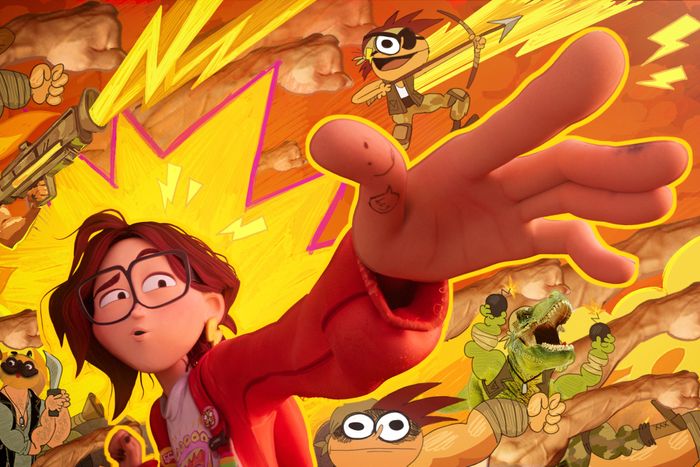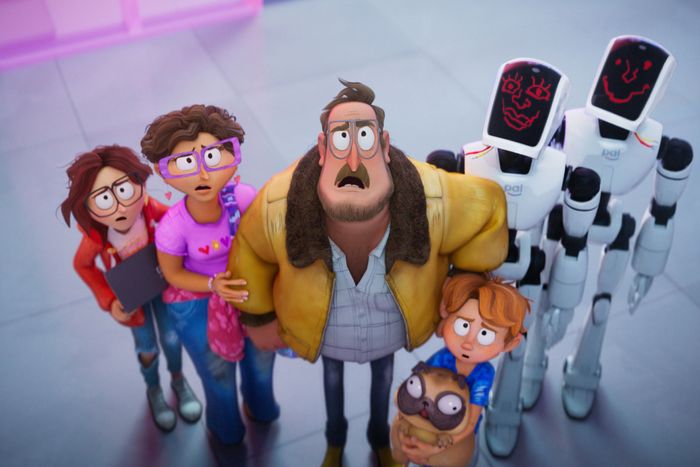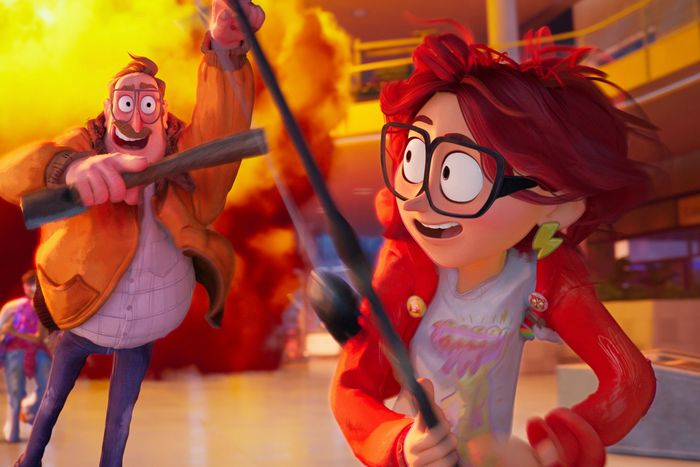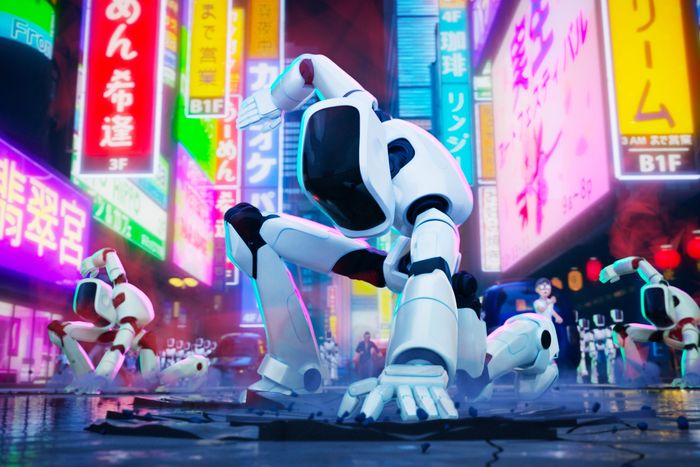
If Mike Rianda warms to you, he’ll start laughing at you. His actors mention this, but I learn it for myself on a Zoom call in mid-April, just a few weeks before the 37-year-old’s directorial debut,The Mitchells vs. the Machines,hits Netflix. The animator has what might most easily be described as a chortle, but such a simplification doesn’t even begin to skim the surface of his breathy, high-pitched chuckle. It strikes at random, especially mid-sentence, like when he’s telling me about the likelihood of technology taking over our lives and suddenly emits the loudest, most enthusiastic laugh I’ve heard during the work-from-home era (and possibly beyond). It’s infectious, deeply warm, and maybe even a little chaotic — and it’s just what you’d expect from an artist who has spent the past decade creating some of animation’s most compellingly earnest, unaffected characters.
Rianda’s laugh has also become a trademark directorial tool. His voice actors say they’ve learned that they’re nailing a take if he can’t stifle his laughter when they’re cutting their lines — although a second take has become standard practice to recapture the magic without Rianda’s sound effects. “Sometimes he’d have to suppress a giggle — that always makes you feel good,” says Maya Rudolph, who plays Linda Mitchell, a character inspired by Rianda’s own mother, in the new animated film.
Much like his laugh, Rianda’s work is similarly vulnerable and worn on the sleeve; he might as well be called the Brené Brown of animators. With only a few projects under his belt — includingThe Mitchells,out on Netflix today and quite possibly one of the warmest and funniest animated movies you’ve ever seen — he has quickly become known by eagle-eyed animation fans as someone special,an unpretentious director with a knack for the explosive, malleable, and always anxious experience of coming of age… at any age.
Rianda grew up an art geek in Salinas, California, spending his free time drawing and watching big-budget comedies likeUncle BuckandNational Lampoon’s Christmas Vacation.His love of animation led to a degree at CalArts and an internship with Pixar. He found a steady home at the mouse company. Shortly after his internship, Rianda was hired to write for (and eventually creative-direct) his friendAlex Hirsch’s animated Disney Channel hitGravity Falls,a now-beloved seriesabout two kid siblings growing up with their con-man uncle in his supernatural forest turned tourist trap.
While Rianda spent years cutting his teeth working for the animation giant, proving early on he had the chops to go the distance in the field,Gravity Fallsdidn’t always foster his creativity. Eight years ago, Rianda mentioned in aReddit AMAthat Disney wouldn’t allow references to real people or products, cut possibly offensive descriptors likewench,and toned down any violence to virtually zero. (Today, though, Rianda won’t speak negatively about Disney; there are simply caveats that come with the cachet of working for the House of Mouse.)
WhenGravity Fallsended in 2016, Rianda felt free, and for the first time not entirely beholden to Disney’s controversy-averse stance in his professional career. Suddenly, though, the rule book that had once felt restrictive now became a safety net he longed for as the film studios he’d impressed with his work onGravity Fallscame calling. “Sony was like, ‘Do you have any ideas for animated movies?’” he recalls. “I have millions of ideas, but I [said] I had nothing: ‘I can’t show you these ideas yet. They’re not polished.’”
Realizing he’d gotten into his own head, but not wanting to pass on an opportunity to direct a feature film delivered on a silver platter, Rianda dug deep to figure out what it was about his often self-inspired work that seemed to resonate with children at Disney, teens on Reddit, and suits at Sony. Like a true comedian, Rianda pitched the studio his best joke yet: his own “crazy” family.
What followed is the semi-autobiographical filmThe Mitchells vs. the Machines.It follows a family road trip gone haywire when a Siri-esque operating system (voiced by Oscar winner Olivia Colman) goes rogue and enlists an army of robots to round up the human race, attempting to banish it to space.
Like the show for which he’s best known,The Mitchells vs. the Machinesis determined to have fun in its utter dystopia. Among Rianda’s most inspired world-building, the Mitchells encounterkaiju-size Furbies, glitchy robots with aSaturday Night Livepedigree, and a sweatshirt-wearing villainous tech bro voiced by Eric Andre.
To those who haven’t seen it, very little about the film’s description might feel steeped in reality. For starters, his family has never faced off in aMad Max–style death race with a technology conglomerate, but hediddaydream of that exact scenario as a kid. “I tried to take the thing that I love the most in the world, which is my insane family, and mix it with what I loved the most when I was a kid, which is killer robots,” he says, drawing on experience to inform his stories. “Whenever I tell stories about my family, people are like, ‘Oh,mydad is insane too!’”
Every member of the titular Mitchells shares Rianda’s familial DNA. Rick Mitchell (sternly and softly played by Danny McBride), is a boisterous outdoorsman stuck in suburbia. He is inspired by the director’s Luddite father. “My dad looks exactly like the dad in the movie,” Rianda says. “He even sounds like Danny McBride.” His mother influenced Linda (passionately and affectionately voiced byRudolph), the family empath and cupcake enthusiast. Early on in production, Rianda informed Rudolph that she had his mother’s blessing to voice her. “I think I have it in writing from Mike that his mom has made it clear that when the pandemic is over, we will be hugging, which I’m really looking forward to,” the actress says.
As for the two Mitchell children, the director based both (including Katie and younger brother Aaron, a dinosaur-loving, antisocial wallflower) on himself (sorry to his older siblings). “Aaronwasme as a very young kid,” he says. “I was very obsessive and really did call video-game stores to be like, ‘Do you want to talk to me about the latest Dreamcast release?’”
For Katie, the film’s college-age protagonist, Rianda describes her as the impassioned, frenzied artist he was as a teen, one perpetually at odds with his (then and now) technologically inept father. Describing Katie’s roots, Rianda immediately performs an impromptu tête-à-tête between himself and his father growing up.
“Why don’t you like hunting and killing deer?” he says, mimicking a deep, fatherly baritone.
“I’m going to draw in the back seat. Nothank you,father!” he says in a prepubescent high-pitched half-scream.
But when I ask about how Katie differs from him, Rianda’s cadence lowers for the first time on our call. His chortle turns into a chuckle. Rianda wrote Katie as a queer character, though he identifies as a straight white man. “Am I allowed to do this?”Rianda says he asked himself during production.
Animators on the film, and later a postproduction screening with GLAAD, informed Rianda that, yes, he could tell an authentic, subtle queer story even if he himself does not identify as gay. In fact, doing so turned out to be a loving homage to the many LGBTQ+ members of the film’s cast and crew. “The movie in a million ways started with my idea, but all these people and all these great artists brought so much to it,” he says.
Throughout our call, Rianda repeatedly emphasized that making the film, which largely occurred before the pandemic, was collaborative — that the team had, in the process of creating a semi-fictional family, become a real one. Executive producers Phil Lord and Christopher Miller, the minds behind the Oscar-winning animated filmSpider-Man: Into the Spider-Verse,showed him how to make an animated movie “look like a drawing,” not some uncanny-valley AI. And in the studio, Rianda spent the most time recording with Abbi Jacobson, the openly queerBroad Cityalum andDisenchantmentactress who voices Katie. Initially, he served as her stand-in scene partner while they tried to cast Aaron. Eventually, Rianda just filled the role himself. “I was so happy he ended up voicing Aaron,” Jacobson says. “He’s such a wonderful director for an actor because he gets the process. He let me play a lot.”
Playfulmight be the best way to describe Rianda. Even on Zoom, he exudes the perpetual, sometimes unsettling, positivity of a camp counselor but with the intention and specificity of a late-career director. And it turns out Rianda was right to bet on the universality of his family’s idiosyncrasies. “The movie is really about trying to reflect reality as closely as we can in the real parts and have the fantastical parts as zany as possible,” Rianda says. “Art has done that to me before. I’ve seen movies before [and thought],I need to call my grandma.As weird as the movie is, we really did have a goal to hopefully, maybe, bring families together.”
It will, soon, for the Rianda clan: His parents are venturing down to Los Angeles for their son’s film opening. A testament to the love for their son, his dad is skipping a hunting trip originally planned for the same weekend. “He’s very proud,” Rianda says. “And my mom just, like, tells the cashier at Star Market, ‘Hey, have you heard about my son’s movie?’They are both very excited… even though my dad does still love hunting.”







